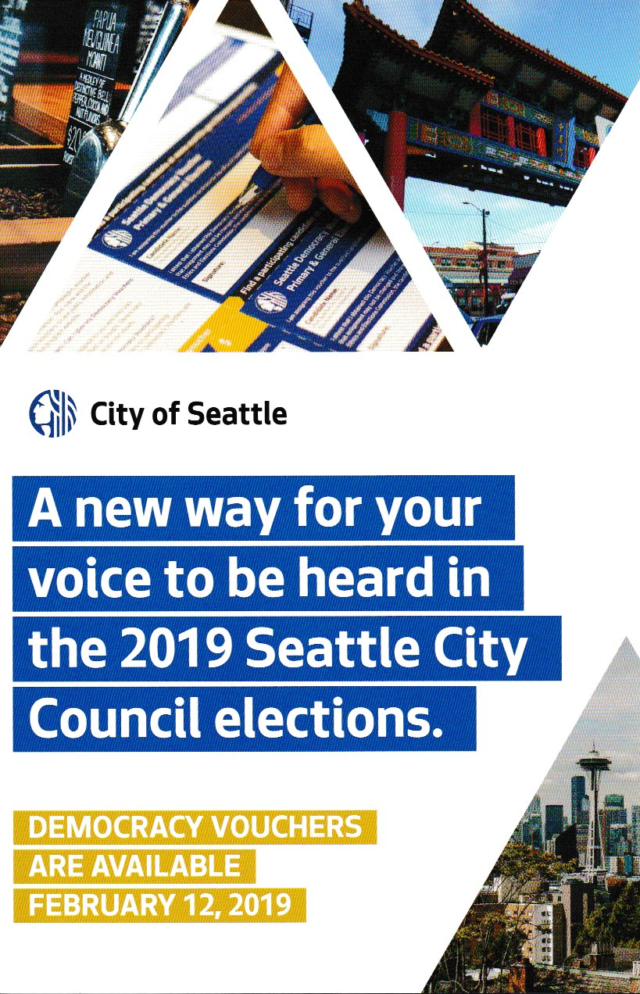
One of the most important storylines from the November 2019 election is the contrast between the success of Seattle’s Democracy Voucher Program, and Amazon’s unsuccessful attempt to purchase Seattle’s city council. Indeed, what transpired in Seattle is a familiar story that is experienced similarly across the country—the constant battle between community power and corporate influence. What is exciting about this particular example, however, is that this time, community power notched a resounding win.
In 2015, with support from the Piper Action Fund and several of our funding partners, advocates successfully passed the Honest Elections Seattle ballot initiative, which created the nation’s first democracy voucher program. First implemented in 2017, the program provides residents with four $25 vouchers they can use to support qualified municipal candidates of their choice. Now completing its second cycle, the Democracy Voucher program has proven to be a remarkably effective tool to diversify the candidate base and increase political participation among small donors.
In 2019, Seattle saw more than 50 candidates declare for seven districted city council seats—the highest number of candidates in the city’s history. Several candidates credited the existence of the Democracy Voucher program with their decision to run for office. All but two of the fourteen who made it to the general election used the program, and six of the seven winning candidates were publicly-financed. In all, more than 38,000 residents used vouchers this year, which is more than double the number of all contributors to the nine races that were up for election in 2015, the last comparable election year. In addition, the larger number of local candidates drove significantly higher voter turnout, with 55.1% of registered voters participating in 2019, compared to just 45.6% in 2015.
After an auspicious start in 2017, and even more promising results in 2019, it is clear that the Democracy Voucher Program is effectively amplifying people’s voices and mitigating the influence of wealthy interests in Seattle politics.
Fearing a lack of support from the city council, Amazon decided to invest $1.5 million—a historic amount—into the Seattle Metropolitan Chamber of Commerce’s super PAC to boost seven candidates it felt would best represent its interests in local government. This investment was perceived as a response to both the rise in the number of community-based candidates as well as the city council’s momentary passage of an “Employee Hours Tax” in 2018 (dubbed the “Amazon tax” by the media). Last year, the city council unanimously supported the new tax as a means to raise funds to address the growing homelessness crisis in Seattle. Amazon quickly responded by threatening to retaliate against local and state leaders and move its headquarters out of Seattle unless the tax was rescinded. Just one month later, the city council repealed the law.
Amazon’s investment in the 2019 city council election made it clear that any move against its interests would result in a robust response from the city’s corporate elite.
Many observers expected Amazon’s political giving to pay off in spades. The city had never witnessed such immense funding for independent expenditures at the municipal level. In the District 6 race alone, a single candidate received over $600,000 in PAC support. In fact, nearly $60 was spent for every vote Amazon’s preferred candidate received in District 6—more than any race in Seattle’s history.
The result of Amazon’s overall investment? One solitary win. Technically, two of its candidates were successful but one was an incumbent who received nearly universal support. In fact, following their loss, several losing candidates who were supported by the super PAC publicly denounced Amazon’s involvement in the election. The narrative that arose was that this was a brazen corporate attempt to take over Seattle’s city council, and the voters responded accordingly.
As a result, not only is the city council now more likely to pass—and retain—an Employee Hours Tax, but it is now considering a proposal to limit the fundraising ability of local super PACs by capping contributions to $5,000 per donor. The law would also effectively prevent multinational corporations like Amazon from spending any money in Seattle elections by banning companies with foreign ownership from contributing to local PACs.
Even more exciting is that a growing number of community-led efforts are advancing money in politics reforms across the country. Building off wins and key investments from 2018, this year saw the rise of multi-issue coalitions pursuing campaign finance reforms in New York, Arizona, New Hampshire, Oregon, Maryland, Chicago, San Francisco, Oakland, Philadelphia, Albuquerque, and Portland, ME. Several more efforts are starting to materialize for 2020 and beyond.
This story illustrates the power of investing in structural democracy reforms that are led by community-based organizations. As the majority of our country reels from the fallout of our current national political environment and frets about how to stop the ever-growing rise of corporate money in our democracy, our community-based partners are doing just that. These efforts are building momentum for meaningful reform, activating communities around a pro-democracy agenda, and resulting in a stronger movement for all.